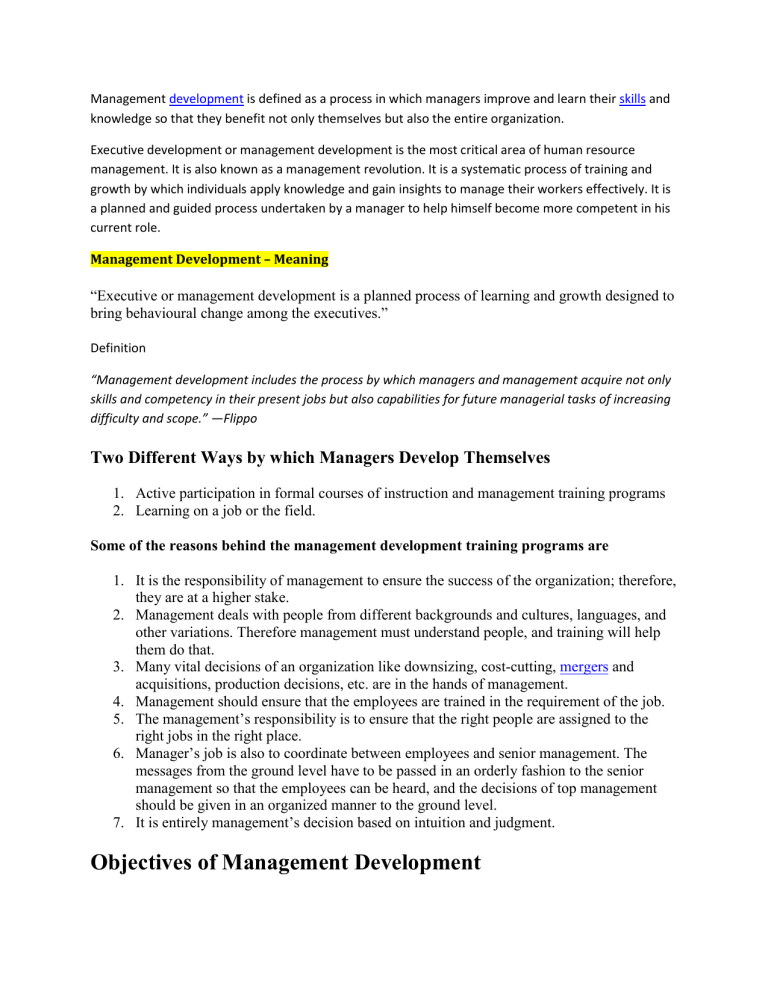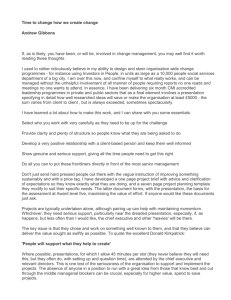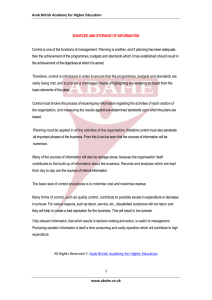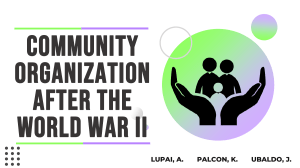
Management development is defined as a process in which managers improve and learn their skills and knowledge so that they benefit not only themselves but also the entire organization. Executive development or management development is the most critical area of human resource management. It is also known as a management revolution. It is a systematic process of training and growth by which individuals apply knowledge and gain insights to manage their workers effectively. It is a planned and guided process undertaken by a manager to help himself become more competent in his current role. Management Development – Meaning “Executive or management development is a planned process of learning and growth designed to bring behavioural change among the executives.” Definition “Management development includes the process by which managers and management acquire not only skills and competency in their present jobs but also capabilities for future managerial tasks of increasing difficulty and scope.” —Flippo Two Different Ways by which Managers Develop Themselves 1. Active participation in formal courses of instruction and management training programs 2. Learning on a job or the field. Some of the reasons behind the management development training programs are 1. It is the responsibility of management to ensure the success of the organization; therefore, they are at a higher stake. 2. Management deals with people from different backgrounds and cultures, languages, and other variations. Therefore management must understand people, and training will help them do that. 3. Many vital decisions of an organization like downsizing, cost-cutting, mergers and acquisitions, production decisions, etc. are in the hands of management. 4. Management should ensure that the employees are trained in the requirement of the job. 5. The management’s responsibility is to ensure that the right people are assigned to the right jobs in the right place. 6. Manager’s job is also to coordinate between employees and senior management. The messages from the ground level have to be passed in an orderly fashion to the senior management so that the employees can be heard, and the decisions of top management should be given in an organized manner to the ground level. 7. It is entirely management’s decision based on intuition and judgment. Objectives of Management Development 1. Ensuring that the organization is correctly staffed now as well as in the future with a relevant number of managers having the necessary experience and skills. They will have to ensure that the managers are committed to growth and maintaining or increasing the profitability by placing the correct man for the proper job. This will also ensure that there are competent people in the organization at every level. 2. Ensuring that the organization’s human resources are entirely used so that humans’ talent and potential as a resource are optimally utilized. They should neither be wasted nor underutilized. Also, to ensure that the needs of both individuals as well as organizations are correctly and timely met. 3. Providing Equal opportunity for the staff in the organization so that they can prepare themselves for senior assignments. The career expectations of the staff should be fulfilled with the help of training. Training will enable them for bigger jobs and better responsibilities. 4. Apart from that, there could be many other objectives: preventing the obsolescence of managers, expanding the existing business or starting a new business, replacing old executives with young talent, and promoting high ethical values in the organization. Management Development – Importance Management or executive development is an organised and: planned process and programme of training and growth by which individual manager or executive at each level of management hierarchy gains and applies knowledge, skills, insights and attitudes to manage workers and the work organisations effectively. Of course, it is beyond the shadow of doubt that the company can only create the favourable climate for the development of managers. Ultimately, in any programme of management development, self-development will be the key-factor to determine the success of the programme of executive development. In other words, the participants in this programme must have the capacity to learn and develop and they must be highly motivated to achieve the planned objectives. Executive development is the guided self-discovery and self-development. Management Development is important because of the following reasons: (1) Management and labour relationship is becoming more complex. (2) Business and industrial leaders are increasingly recognizing their social and public responsibilities. (3) Management of public utilities, state enterprises and civic bodies are being professionalized in order to improve operational efficiency. (4) Rapid technological and social change in society requires training of managers. (5) The size and complexity of organizations are increasing day by day. Management Development – Why is Management Development Needed? A business organisation has to develop the potential of all those who are in management positions or who are fresh from management positions or who are fresh from management institutions and have the potential for development. This development is necessary because of the following reasons: (a) The competition for talented people who are capable of development is increasing. They are less in supply as per the demand. The need for their development in organisation is felt. The talented persons can give better performance for improving effectiveness of the organisation. (b) Society is facing a rapid rate of technological and social change. Under changing business environment the changes are to be managed so that technology can be operated properly and products and services can be modified as per needs of the customers in the society. (c) Business and industrial leaders are increasingly recognising their social and public responsibilities which call for a much broader outlook on the part of management. The social responsibility is to be fulfilled to stay in high image of the public. (d) Managers have to be developed for handling problems arising out of increasing size and complexity of organisations. Due to entry in a large number of markets with more number of products the size is increasing and organisation is becoming more complex. To deal with this situation the skilled managers are needed. (e) There is need to improve performance despite these complicated environmental factors. The efforts are needed in business to improve its product, lower its cost and extend its use will continue to be a major aim of managers. The high competency managers are needed for this purpose. (f) Management labour relations are becoming increasingly complex. Due to diversity in organisation the relationship between different parties becomes a major issue. The trained and experienced managers can deal this situation properly for developing healthy work environment. (g) To understand and adjust to changes in socio-economic forces including changes in public policy and concepts of social justice and industrial democracy problems of ecology. But it was also pointed out that if the human resource is to become a critical success factor; organisations must be prepared to develop individual managers and management teams that are not only flexible, adaptable and innovative in technical, financial and business issues, but skilled in HRM as well. To achieve this, organisations must be prepared to establish as a strategic imperative, greater investment in continuous management education and development. Organisations which take sincere efforts and invest in management development process for development of the managers and potential managers, it gets benefits in the following activities – (a) Exploit future opportunities and potential. (b) Adapt successfully in the face of major change. (c) Develop new markets and products. (d) Retain and motivate employees. (e) Create and sustain an effective management team. (f) Survive and prosper. Basic features of Management Development has been explained in the followings: 1. Management development is a planned and organized process of learning. 2. It is an ongoing or never ending exercise. It continuous throughout an executive’s entire professional career because there is no end to learning. 3. It is a long-term process as managerial skills cannot be developed overnight 4. It is guided self-development. An organisation can provide full opportunities for development of its present and potential managers. 5. It aims at preparing managers for better performance and helping them to realise their full potential. Management Development Programme (MDP): The process of management development begins with top management’s recognition of the need for MDP. Development of suitable policy guidelines and assignment of special responsibility for executing the policy create a favourable climate of on-the-job growth, personal improvement and development of managers. A special committee of senior executives will look after planning and guiding management development. The personnel manager and special training staff will administer the routine of MDP. Management Development – Process: 5 Steps in the Process of Management Development The process of management development should follow certain steps: 1. Determination of Organization’s Objectives: The process of management development must begin by looking at the organization’s objectives. The objectives will provide us the direction we must go and give a framework to determine our managerial needs. 2. Appraisal of Current Management Resources: On the basis of the information gathered from human resource planning, we can prepare an executive inventory. The executive inventory can provide us background and qualifications of our current managers as to appraise our current management resources. 3. Ascertain the Development Activities: The third step in a sound management development is to ascertain the development activities needed to ensure that we have adequate managerial talent to fulfill future managerial needs. This analysis can tell us the potential obsolescence of some our executives, the inexperience or shortage of managers in certain functions, and skill deficiencies relative to our future needs. 4. Determine Individual Development Needs: The next step is to identify individual development needs: skill development, changing attitudes, and knowledge acquisition. Generally, most of management development effort focuses on the changing of attitudes and the acquisition of knowledge in specific areas. The assessment centre can prove to be an effective tool to determine what specific development attempts our managers need. The assessment centers can also be used to assess current and potential managers to find out what development activities might be necessary to improve their job performance. Assessment centers thus become a definitive source for selecting and developing managers. 5. Evaluation: The final step in the process is to evaluate the management development efforts. Once managers have engaged in development activities, it is necessary to assess changes in behavior and managerial performance. Contents of a Management Development Programme: The contents of a management development programme depend to a large extent upon the needs of an enterprise. Such programmes are basically personnel development programmes which provide a framework for the consideration of problems in developing an executive or management development programme. The items generally covered are individual development techniques, organisation analysis and planning, managerial appraisal and inventory, and such other items which may increase the skill of existing managers so that they may shoulder more responsibilities easily after promotion and so on. Thus, a management development programme must have: 1. A carefully considered plan and organisation for carrying out such a programme 2. A periodic appraisal of each executive regarding his/her performance, skill and capabilities and need for further development 3. After evaluation, the plans for individual development should be chalked out and then the programme should be organised 4. Programme evaluation, in terms of its cost and time, is also essential. As a matter of fact, the contents of development programmes should be based on the tasks the executives are most likely to encounter. That is why we find that most executive development programmes take up various subjects connected with handling people, that is, human relations. According to Michael J. Jucius, under such programmes, the subjects such as the following ones are discussed: 1. Present-day labour management philosophy and policies 2. Working with others through organisational channels 3. Communicating up and down organisational channels 4. Employment policies and practices 5. Training and education policies and practices 6. Discipline, grievances, and rules and regulations 7. Employee services and recreation 8. Transfers, promotions, merit and seniority policies 9. The union contract—its meaning and implications 10. Community agencies and institutions. As an executive has to work as a leader, the contents of an executive development programme should be related to the characteristics a leader should possess. Michael J. Jucius has pointed the following characteristics to which attention should be paid in executive development programmes: 1. Ability to think 2. Ability to organise 3. Ability to handle people 4. Ability to plan 5. Ability to lead 6. Ability to obtain and interpret facts 7. Loyalty 8. Decisiveness 9. Teaching ability 10. Ability to solve problems 11. Courage 12. Self-motivation 13. Desire for achievement and prestige 14. Social balance and understanding 15. Sense of responsibility 16. Emotional balance and poise 17. Ability to influence people, individually and in groups 18. Attitude towards subordinates and associates 19. Attitude towards community and associations 20. Attitude towards economic and political systems. While establishing its own development programme, an organisation should give consideration to outside practices and also take its own needs into consideration. Management Development Programme Process: The following steps are involved in the process of management development programme: 1. Diagnosis of Organization’s Needs – It is necessary to identify the organisations needs in the line of organisation’s objectives for the development of its managers. 2. Appraisal of Present Managers Abilities – To find out the gap between the actual performance of job and the standard performance of job. 3. Set the Objectives of Development Programme – Now the next step is to set the objectives of a particular management development programme. 4. Preparation of Manager Inventory – For the purpose of getting manager inventory the following information about each manager is necessary- Name, age, qualification, work experience, tenure of service, place of posting, nature of job and performance appraisal data, etc. This helps in the selection of manager for development programmes. 5. Planning of Individual Development Programme – On the basis of manager inventory, it is easy to find out the strengths and weaknesses of each of the managers. This helps in training framing and launching tailor made programmes. 6. Establishment of Development Programme – After this the responsibility of HR manager or Training and Development manager is to establish development programme for manager like leadership courses, decision making, creative thinking, management games and sensitivity training etc. 7. Evaluation of Development Programme – The last step is to evaluate the development programme in the line of the objectives of the programme. According to Tracey (1971) the most important means of evaluating development programme are observation, ratings, training surveys and training interviews. The need for management development can be ascertained from the following: 1. Social Obligation: Organization is a part of society. Society has expectations, demands for its growth and development from societal members including organization/s functioning in the society. Organization can fulfil societal demands / requirement if managers are capable enough to analyse social obligations to present cases as spokesperson of the society to the company, to develop a bridge between company thinking and societal expectations, to make the society aware of Contributions Company made for amelioration and well-being of the members of the society. Hence, management development is needed to prepare capable and effective managers. 2. Effect of Globalization: Because of globalization, multinational corporations (MNCs) and trans-national corporations (TNCs) have entered in the market resulting in, stiff competition amongst the market players. In such a situation, it becomes difficult for the domestic companies to survive in the context of quality goods they supply and the price they fix for the customers. It is, therefore, imperative need for the companies to have world class workers for production of world class product at reasonable cost; and the companies can have such dynamic workforce if, they have highly skilled, committed, dynamic pool of management personnel who can prepare the workers’ community according to need, requirement of the companies. So, here is the necessity of management development to face the challenges emanated from the globalization. 3. Effective Functioning of Line Management: Line management/technocrats are well conversant with technicalities of production activities but, they may lack adequate skill, abilities in human relations development and conceptual areas of the company. For effective functioning of their work they need improvement, development of their skills in those areas where they lack. Hence, management development programmes are required to be conducted to promote enhancement of human skill and conceptual skill of technocrats, line managers of organizations so that, they can perform their job better in terms of need, requirement of the companies. 4. Excellent Quality of Work of Non-Technical Higher Management: Technical skill is required for excellent performance by nontechnical managers. Requirement of technical skill of management personnel varies in degree considering grade/strata of the management to which they belong. Higher level management may need some knowledge/skill in technical areas and so, for better functioning they need to acquire skill in this area. Management development programme designed to impart technical skill to such non-technical higher management personnel may facilitate to deliver excellent quality of work by them. 5. Use of Latest Technologies: Every organization needs to use latest technologies in its operational and service activities so that, quality goods at minimum cost can be produced to face competition with the market players but, these latest technologies cannot be effectively used if, the managers are not given proper training to have acquaintances with technologies, its operative areas, use, effectiveness, probable problems, etc. 6. Change in Economic Policy: Change in economic policy creates a new business climate and work culture in organization where re-inventing of management practices appears to be of much necessity. New areas are required to be explored for expansion and diversification of business; continuous improvement of quality in services and products needs to be emphasised; issues like retention of customers and search out for new customer be prioritized. For all these, executives need an enrichment of knowledge, specific thought pattern, creative thinking, analytical ability, meaningful vision and foresightedness, and this is possible through organizing tailor-made development programmes which may enable higher management to explore new areas and to practice in the company to confront changes. 7. Smooth and Effective Functioning of Business Activities: Workers perform business and industrial activities under the guidance and supervision of management. Management personnel play the role of guide, coach, motivator, leader of the people at work. Workers can be effective if the decisions, directions, guidance of the management are proper, perfect and accurate. So, for smooth, effective and uninterrupted functioning of business activities managers should have leadership qualities, proper knowledge, skill in decision making and also should introduce schemes like employee involvement, empowerment and participation in organization. For all this, management development programme should be of much use. the five most common skills addressed in senior executive training are: 1. 2. 3. 4. 5. Communication skills Developing and coaching others Team leadership Strategy development and alignment Change leaderships




